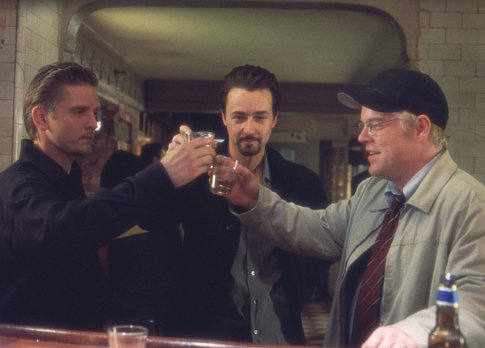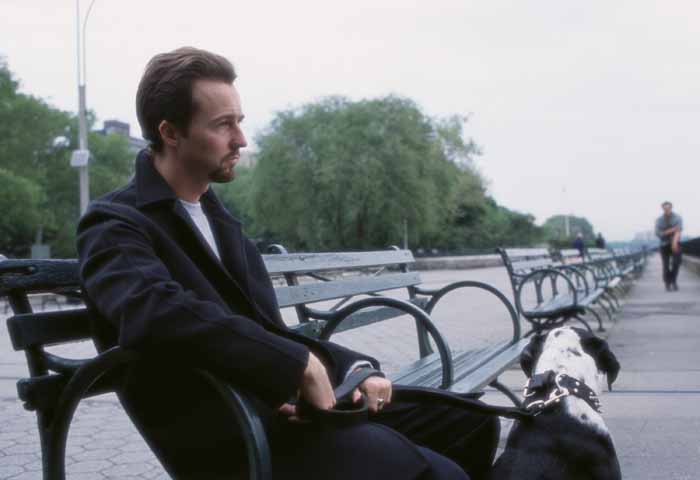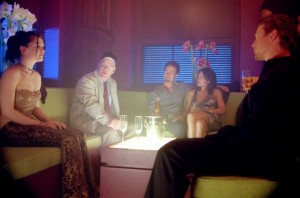From the January 17, 2003 issue of the Chicago Reader. For those who care about such things, there are spoilers ahead. — J.R.
25th Hour
**** (Masterpiece)
Directed by Spike Lee
Written by David Benioff
With Edward Norton, Philip Seymour Hoffman, Barry Pepper, Rosario Dawson, Anna Paquin, Brian Cox, Tony Siragusa, and Levani.
I’ve complained a lot about Spike Lee as a filmmaker, before he made his remarkable Do the Right Thing (1989) and after. But the only time I’ve been tempted to accuse him of falling back on the tried and true was when he made Malcolm X and attempted to adapt his subject’s autobiography as if he were Cecil B. De Mille or David O. Selznick. I don’t mean that Lee hasn’t stubbornly stuck to the same stylistic tropes and mannerisms throughout most of his career — leaving them behind only when the occasion demanded it, as in his expert filming of Roger Guenveur Smith’s powerful performance piece The Huey P. Newton Story — but the stylistic consistency is his own. Moreover, taking on dissimilar projects he has always moved in exploratory directions, showing a lot of courage and initiative in his creative choices — even when they’re half-baked (as some are in Get on the Bus) or overblown (as in Bamboozled).
25th Hour is Lee’s best feature since Do the Right Thing, and part of what’s so impressive about it is the way it gets us to think as well as feel — about things we’re almost never asked to consider, such as what it means to send drug dealers to prison. I suspect one reason this country has more than two million people in prison — we have the second-highest incarceration rate in the world, after Russia — is that the sort of people who wind up there, why they do, and what happens to them inside, are all things we don’t really want to think about. The focus of 25th Hour, adapted by David Benioff from his novel, is how a Manhattan drug dealer named Monty Brogan (Edward Norton) spends his last 24 hours before going to prison for seven years. The film also concerns the four people who are most important to him — his girlfriend Naturelle (Rosario Dawson), his father James (Brian Cox), and his two best friends since he was a kid, a prep school teacher named Jake (Philip Seymour Hoffman) and a Wall Street trader named Frank (Barry Pepper). I’ve heard some people object to a film asking us to think — and therefore care — about what happens to a drug dealer in prison. But would they also object to being asked to care about the people who do care about him? And if we do care about Naturelle, James, Jake, and Frank, how can we not care about Monty?
I hasten to add that there’s nothing moralistic or preachy about 25th Hour — or intellectual either. Lee’s movie shows no interest in making any case about whether drug dealers should go to prison. In fact, it might be said that this movie isn’t even about drug dealers; it’s about Monty, a former drug dealer going to prison, and the people he knows. Yet Lee and his cast are so adept at getting us acquainted with Monty and these other people that we wind up feeling like we’ve known them for years, and this familiarity affects how we feel about what happens to them.
When Nikolai — the drug baron Monty’s been working for, who’s spent a considerable portion of his own life in prison — advises Monty to find the weakest, most helpless person there as soon as he arrives and beat him until his eyes bleed, the most horrifying thing about this suggestion is that it sounds more practical than hyperbolic. We believe it in the same way and to the same degree that we believe in Monty and his circle.
Not having read Benioff’s novel, I don’t know whether it was his decision or Lee’s not to show Monty selling drugs in any of the flashbacks. (The closest he comes is a very early scene that shows Monty brushing off a junkie, explaining that he’s been busted.) Without quite wanting to accuse the film of cheating, I find this a regrettable omission, though I know its inclusion might have made it harder to persuade us to see Monty sympathetically. In the film’s press book Lee is quoted as saying, “I don’t choose which films to direct based on how sympathetic the characters are. Monty Brogan is a drug dealer — and people will find that unsympathetic. But a lot of times, unsympathetic characters make the best movies, have the best stories.” Yet whether Lee truly shows Monty as unsympathetic is somewhat ambiguous. I don’t object to this ambiguity, because it’s one of the things in the movie that obliges us to think. And the relatively unsympathetic treatment of the cops who arrest and question Monty — most of whom are black, and most of whom are shown taking a sadistic pleasure in his predicament — only adds to the ambiguity. When Monty’s offered an opportunity to lighten his sentence by ratting on others, we’re implicitly asked to reflect on what we might do in the same situation.
The classic Lee tropes and mannerisms that appear in 25th Hour include jump cuts, alternate takes of the same action (Monty and Naturelle rushing toward each other into an embrace) repeated in rapid succession, arias of ethnic abuse, dreamy camera movements that make the characters appear to float or glide in midair, and wall-to-wall music. One such aria starts when Monty encounters the phrase “fuck you” on a bathroom mirror and improvises a somewhat literary and self-conscious monologue that begins “Fuck the whole city” and goes on to list all the local groups and types he hates. Lee illustrates the catalog with a string of slightly bleached-out images of people in each category: Wall Street brokers, “Upper East Side wives,” downtown homosexuals, “brothers” playing basketball, cops, priests who abuse boys, the people who protect them, Osama bin Laden, al Qaeda, his friends Jake and Frank, Naturelle (who he believes may have betrayed him to the cops), his father — even himself for getting caught (“You had it all, and you threw it away”).
This passage recalls the litany of racial insults in Do the Right Thing, though I’ve read that a version of Monty’s monologue figures in Benioff’s novel and that Benioff excluded it from his original script and then restored it, over Disney’s objections, at Lee’s insistence. (This scene includes the lines “Send those Enron bastards to jail for life. Do you think Cheney didn’t know about them? Give me a fucking break”; it’s one of the moments in the film when a sense of currency enhances the overall emotional thrust — as the haunting images of Ground Zero in lower Manhattan do.) Later, Lee brings back some of these groups and has them wave good-bye to Monty when he leaves the city, treating them as emblems he’s sorry to leave behind.
The gliding camera movements accompany the erotic reveries of two characters visiting the same club: that of Mary (Anna Paquin, who played the daughter in The Piano a decade ago), a flirtatious high school student who’s been coming on to Jake, her teacher, and is drifting to the music, and that of Jake after he kisses her. The relationship between these two is the film’s only subplot, and it’s a useful one insofar as it shows us the kind of innocence all the other characters have lost.
At one point Frank says to Jake, “You’re a rich Jewish kid from the Upper West Side who’s ashamed of his wealth.” This isn’t the only thing Jake feels guilty about; he castigates himself for being attracted to Mary long before he kisses her. But Frank, who shares Monty’s working-class Irish roots, is an even more complex character when it comes to guilt; he feels guilty about Monty’s predicament and perhaps, more subtly, about some of his activities on Wall Street.
I’ve tended to think of the wall-to-wall music in Lee’s movies as a flaw, because it doesn’t give the viewer enough breathing space. But here the music (composed by Lee regular Terence Blanchard) is more functional: it’s generally less noticeable, which is to say better integrated. And maybe because Lee relies on and works with the viewer’s imagination and initiative in so many other areas, it’s less harmful. Sometimes he even sculpts it around the action: when the sound of a tugboat figures briefly in one scene, the music stops long enough to let us hear it.
The very first thing we encounter in the film, at the same time that Disney’s Touchstone logo appears, is the sound of a dog being beaten. We don’t know who’s doing the beating or why, and we never find out — which means we have to think about it. Yet there’s nothing gratuitous about this detail, because before the credits come on we see two guys getting out of a car on a New York highway, Monty and a rotund Ukrainian colleague named Kostya (Tony Siragusa) — Monty has seen the dog and insists on stopping. A comic scene ensues as Monty, who wants to adopt the dog even though its hip may be broken, tries to maneuver it into the car’s trunk, while the dog keeps growling and snapping at him. Kostya, whose English isn’t great, keeps calling the dog a “bullpit” and objecting to the delay; we later figure out they must have been en route to a drug deal. Attempting to invoke Murphy’s Law, Kostya comes up with “Doyle’s Law,” and the next time we see Monty he’s walking the fully recovered dog, now named Doyle.
The last thing we see in the film is a close-up of Monty, his face battered and bruised, while his father drives him to prison — a shot that gets us to think much as the sound of Doyle being beaten does. This isn’t because we don’t know who gave Monty the bruises or why, though he’s lied about it to his father. In a previous scene Monty — a handsome guy, named by his late mother after Montgomery Clift — first demands that Frank beat him to a pulp, then goads him, against his will, into it. This is because he knows he’s less likely to get raped in prison if he looks a mess when he arrives. Mercifully Lee dispenses with music during this stretch and eliminates most other sounds as well; the scene would clearly be less wrenching with them. As we stare at the close-up of Monty’s face we can’t help wondering what awaits him during the next seven years.
But what if his father were to go on driving, not to the prison but across the United States, dropping Monty in some inconspicuous desert town with the understanding that they’ll never see each other again, that Monty will adopt a new identity, start a new life? This is a possibility the film also gets us to think about at length, though in a different way. Just before that final close-up of Monty in the car, the movie illustrates this plan, his father going through every step in detail, all the way up to Monty’s happy and contented old age after having lived an alternate life. We’re asked to think about not just how such a plan might be carried out but whether this is the ending to the movie that we want. Is this what actually happens to Monty? And if we prefer the alternate ending, does that mean that we don’t think drug dealers should go to prison?
Thinking about a dog being beaten, about a drug dealer going to prison, about a drug dealer not going to prison, doesn’t require us to solve a puzzle, to come up with some bright solution. It just means thinking about what happens in our world and theirs — which are really the same world. And as Lee shows us, feeling our way into that world is another way of thinking about it.








